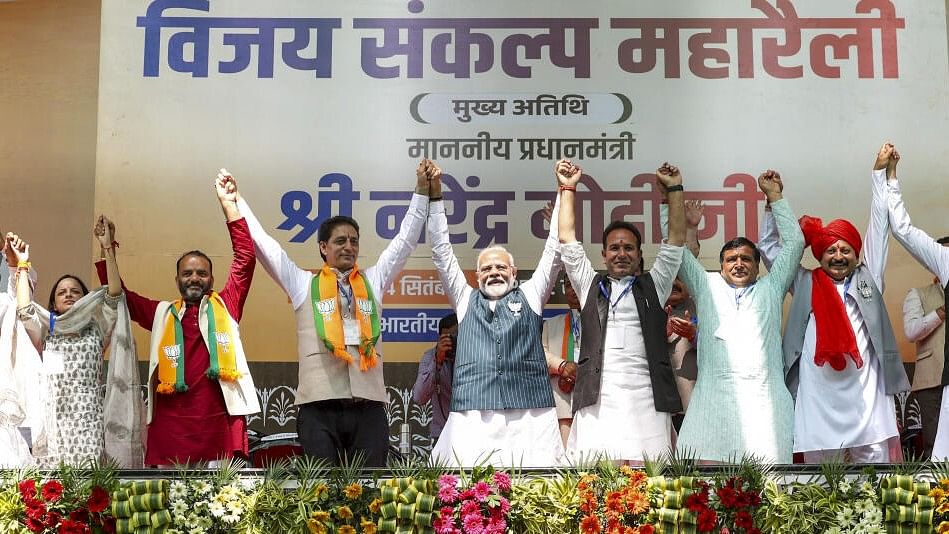
Prime Minister Narendra Modi with others during a public meeting ahead of the upcoming Jammu and Kashmir Assembly elections, in Doda district.
Credit: PTI Photo
The Jammu and Kashmir Assembly elections will be a critical test for the Bharatiya Janata Party (BJP), which, through its government at the Centre, has been indirectly governing the state-turned-union territory for the past six years. These polls will measure public sentiment regarding the party's governance and policies in the union territory, especially following the revocation of Article 370.
Although violence in the Valley has significantly decreased over the years, politically the BJP remains anathema, and this is not lost to the party. It did not field candidates from the Valley in the last parliamentary elections. The BJP understands that its path to power in J&K runs through the Jammu region, which is its political stronghold. The region has long felt marginalised by Kashmir, fostering a deep-rooted ‘anti-Kashmir’ sentiment.
The party’s campaign and rhetoric carry distinct regional overtones with religious undertones.
Historically, the groundwork for the abrogation of Article 370 began with the Jammu Praja Parishad, founded in 1947, which led the agitations for J&K’s full integration with India. Prem Nath Dogra, a Rashtriya Swayamsevak Sangh (RSS) member and a prominent face of the movement, led protests against Sheikh Abdullah’s policies, for which he was arrested multiple times. The BJP, in its manifesto, promises to introduce the Pandit Prem Nath Dogra Rozgar Yojana to create 5 lakh employment opportunities in J&K.
Maharaja Hari Singh, the last Dogra ruler of J&K, remains a key figure in the BJP’s narrative. Jammu, which was an important seat of power under Singh, has long harboured grievances over the ‘unfair’ treatment meted out to Singh by the Kashmir-based political leadership. The government’s decision, in 2020, to cancel the public holiday commemorating Abdullah’s birth anniversary, followed by the announcement of a holiday for Singh’s birth anniversary, reflects the BJP's efforts to amplify Jammu’s regional identity.
Addressing a rally in Doda, Modi said that Jammu has suffered because of the politics of ‘hatred’ and ‘discrimination’ by the National Conference and Congress. He also said that the statements by the NC-Congress combine against Singh were an insult to the Dogras of Jammu.
The BJP also promises to introduce the Sri Maharaja Hari Singh Bima Yojana (SMHSBY), which will provide free personal accidental insurance. By blaming the NC and the Congress for the alleged mistreatment of Singh, the BJP aims to widen the chasm between Jammu and Kashmir, portraying the opposition as working against Jammu's interests.
Since 2002, the electoral verdicts in the Valley have been split between the NC and the People’s Democratic Party (PDP). It gave room for Jammu to be part of governance and was represented first by the Congress and later the BJP. With a likely split verdict expected in the Valley again, the BJP is concentrating its efforts on sweeping Jammu to secure political control of the union territory.
The party’s manifesto includes a chapter titled ‘Recognising the Struggles of Jammu Region: A Concerted Push to Fast-track Development’, highlighting plans to rename the Sher-e-Kashmir University of Agricultural Sciences and Technology after Baba Jitto, a social reformer. Sheikh Abdullah is called Sher-e-Kashmir whose policies were questioned and contested in Jammu.
Union Home Minister Amit Shah, in a speech on September 7, accused the NC and the Congress of intending to release stone-pelters and terrorists to revive terrorism in Jammu. This was said when more than 50 security personnel died in terrorist incidents in Jammu over the past three years.
Shah’s speech brought out the broad contours of the BJP’s political campaign. Shah said Jammu would decide the next government but also warned that if the NC-Congress coalition wins, Jammu would be left dependent on Kashmir.
While Kashmir-based political parties campaign for the restoration of statehood and Article 370, the BJP has remained notably silent on these issues. Shah’s vague assurances that statehood would be restored “at an appropriate time” suggest the BJP is downplaying the issue, instead focusing on Jammu’s identity and sidelining Kashmir from governance.
For years, Jammu has challenged the accuracy of the 2011 census, claiming that the region’s population was undercounted, resulting in inadequate representation in the Assembly. The Delimitation Commission has though awarded six additional seats to Jammu and only one to the Valley, which has raised questions among Kashmir’s leadership. The BJP manifesto does not address Kashmir’s concern, but instead promises a ‘fair and free’ census to ensure inclusive development.
Though Jammu has been asserting its identity which it believes was subjugated earlier by Kashmir-centric policies, it has long resisted communal conflicts despite the targeted killings of Hindus by terrorists.
Exacerbating the regional divide on religious lines can further polarise this border region where peace remains elusive.
(Tarun Upadhyay is a Jammu-based journalist. X: @tarun33.)
Disclaimer: The views expressed above are the author's own. They do not necessarily reflect the views of DH.